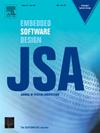基于共享总线的异构计算系统的竞争感知工作流调度
IF 3.7
2区 计算机科学
Q1 COMPUTER SCIENCE, HARDWARE & ARCHITECTURE
引用次数: 0
摘要
异构计算系统(HCSs)通过利用不同的计算资源来平衡性能和效率,被广泛用于执行工作流应用程序。这些计算资源通常通过共享总线相互连接。当多个参与者同时传输数据时,会产生通信争用,导致通信时间超过预期。然而,文献中很少研究共享总线的争用问题。为了有效地解决基于共享总线的工作流调度问题,提出了一种基于争用感知聚类的列表调度方法。在CACL中,将任务根据临界程度分组,将集群映射到计算资源,然后将工作流中的所有任务和边调度到HCS中的计算和通信资源中。在实际工作流中的实验结果表明,该算法有效地解决了通信争用问题,与现有方法相比,调度长度减少了5% ~ 25%,是一种鲁棒的基于共享总线的工作流调度方案。本文章由计算机程序翻译,如有差异,请以英文原文为准。
Contention-aware workflow scheduling on heterogeneous computing systems with shared buses
Heterogeneous computing systems (HCSs), which balance performance and efficiency by leveraging diverse computation resources, are widely used for executing workflow applications. These computation resources are typically interconnected through shared buses. When multiple participants simultaneously transmit data, communication contention arises, leading to longer communication time than expected. Nevertheless, the contention issue for the shared bus is rarely investigated in the literature. This paper proposes a Contention-Aware Clustering-based List scheduling (CACL) method to effectively address workflow scheduling in shared bus-based HCSs. In CACL, tasks are grouped into clusters based on criticality, clusters are mapped to computation resources, and then all tasks and edges in the workflow are scheduled to computation and communication resources in the HCS. Experimental results on realistic workflows demonstrate that CACL effectively addresses the communication contention issue, and reduces scheduling length by 5%–25% compared to existing methods, making it a robust solution for workflow scheduling in shared-bus-based HCSs.
求助全文
通过发布文献求助,成功后即可免费获取论文全文。
去求助
来源期刊

Journal of Systems Architecture
工程技术-计算机:硬件
CiteScore
8.70
自引率
15.60%
发文量
226
审稿时长
46 days
期刊介绍:
The Journal of Systems Architecture: Embedded Software Design (JSA) is a journal covering all design and architectural aspects related to embedded systems and software. It ranges from the microarchitecture level via the system software level up to the application-specific architecture level. Aspects such as real-time systems, operating systems, FPGA programming, programming languages, communications (limited to analysis and the software stack), mobile systems, parallel and distributed architectures as well as additional subjects in the computer and system architecture area will fall within the scope of this journal. Technology will not be a main focus, but its use and relevance to particular designs will be. Case studies are welcome but must contribute more than just a design for a particular piece of software.
Design automation of such systems including methodologies, techniques and tools for their design as well as novel designs of software components fall within the scope of this journal. Novel applications that use embedded systems are also central in this journal. While hardware is not a part of this journal hardware/software co-design methods that consider interplay between software and hardware components with and emphasis on software are also relevant here.
 求助内容:
求助内容: 应助结果提醒方式:
应助结果提醒方式:


